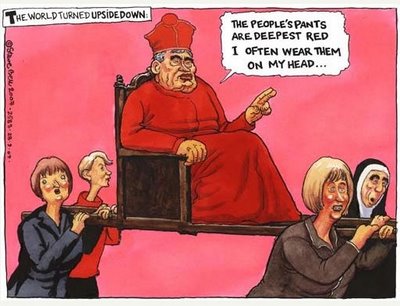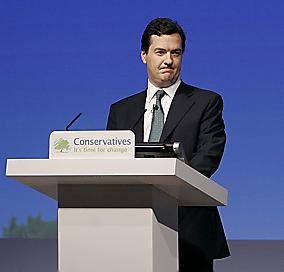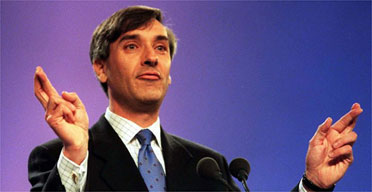Social democracy died long ago, Polly.
 Unlike some others in the "blogosphere" who love to tear apart Polly Toynbee's twice-weekly prognostications in the Grauniad (she's columnist of the year, doncha know?), I usually just read her articles, filled as they are with a bizarre Labour love fetish, agree or disagree, and move on. Sure, she talks a lot of bull on occasion, but then so do most newspaper comment piece providers.
Unlike some others in the "blogosphere" who love to tear apart Polly Toynbee's twice-weekly prognostications in the Grauniad (she's columnist of the year, doncha know?), I usually just read her articles, filled as they are with a bizarre Labour love fetish, agree or disagree, and move on. Sure, she talks a lot of bull on occasion, but then so do most newspaper comment piece providers.Today though she's having one of her twice yearly doubts about just how marvellous Tony/Gordon are. These inevitably follow the latest budget/pre-budget report, which again failed to allocate significant amounts of money to tax credits and abolishing child poverty. It happens invariably every year, but still Polly brushes it off and goes back to pleasuring herself with the clunking fist still foremost in her mind, unable to see the reality that should be staring her in the face: Labour's finished, and all it cares for now is staying in power and standing very, very slightly to the left of the Conservatives.
The really perplexing thing about all this is that Polly once admitted as much in a rare, truly honest piece back in January last year, when she wrote that the Social Democratic Party she was a part of back in the "bad old days" of Militant and Foot was to the left of where New Labour is now. She opined:
But there is a need for a party more radical than Labour, a party that says no to war and no to wasting billions on new nuclear weapons or nuclear reactors, that dares to talk of the greed of the rich, of boardroom kleptocracy and the duty of top earners to shoulder a fairer share.
She wrote that then, and must have believed it. She must have seen all the warning signs since Brown has taken over: after the competent start and the refusal to play politics with the almost immediate "terror" attacks, it's been all downhill. Where Blair once delighted in playing the hard man and trying his best to appeal to the Sun, Brown's every movement was calculated to please Paul Dacre and the Mail. First the u-turn on the reclassification of cannabis, the change on the supercasinos which so exemplified the Blair era of ultra-consumerism, mass-materialism and living for today, now replaced by the Scot son of the manse's almost puritanical stance which Dacre espouses almost as much as a "double-cunting" to his hacks. Like with Blair, such a ploy was doomed to failure from the beginning. No one, even on the soft centre/centre-right like Blair and Brown can keep such right-wingers on their side for long; after a while they start hankering for the real thing, as Toynbee in today's article herself notes, but even going by the short attention span that afflicts the tabloid press the change in tone after Monday's daylight robbery was brutal. The result was Tuesday's Daily Mail front page: vicious, wounding, and more than accurate.
Why only now then does Toynbee finally realise that it was this week that Labour's leaders left social democracy for death? For years she's put up variously with Labour's ruthless social ill-liberalism (notoriously writing one abysmal article on how the middle class is more concerned about ID cards and civil liberties than child poverty), the disastrous foreign policy post 9/11, its incestuous relationship with the rich and powerful and its complete contempt both for the truth and the public, at the last election urging voters to wear nose pegs and disregard Iraq to vote for the party, yet it takes a predictable and nowhere near as egregious as some of Blair's manoeuvres (rules of the game are changing, dropping of SFO's investigation into BAe, refusal to call for an immediate ceasefire during last year's Lebanon conflict, years of spin and lies) act of political shamelessness for Toynbee to get the message.
Toynbee writes:
We now have a centrist government in Europe's most unequal country. Our government stands somewhat to the right of Angela Merkel's coalition in Germany, to the right of economic policy in France, where Nicolas Sarkozy has absorbed social democrats. Fusion politics, like fusion music and food, is one description of this strange death of the centre-left. At least in Europe there are leftwing parties still to make the public arguments: in England, due to our malfunctioning electoral system, a political generation has barely heard the case for social justice.
Yet whose fault is this? Toynbee helped cut the Labour vote at the exact time when it needed it most in the 80s, and then she urged support for it when it deserved it the least. Through her undying belief that Labour's mild policies on redistribution have been making the difference, she might well have helped destroy any chance of the exact leftwing policies she yearns for being introduced. It's come to something when the Liberal Democrats are the only even slightly appealing mainstream political party, and they're flatlining in the polls, stuck with a decent and honourable leader but one who can't make the difference up. The need for a genuine alternative has never been greater, but Polly has helped towards ensuring that any such alternative is almost impossible under our current system.
Related post:
Mr Eugenides - Polly's Viking lets her down
Labels: death of Labour, death of social democracy, Gordon Brown, inheritance tax, no alternative, Polly Toynbee, pre-budget report




